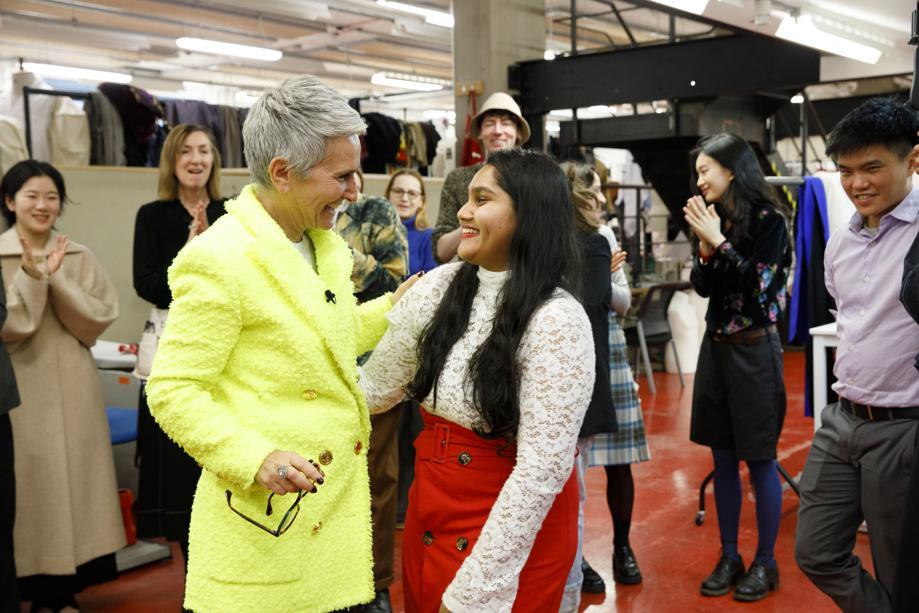Barely through the door of the Royal College of Art, Céline Barel enthuses: “
We are here at the heart of the creation of tomorrow! Sculptor Henry Moore, painter David Hockney, milliner Philip Treacy and even filmmaker Ridley Scott all passed through this prestigious art and design university.
» This March morning, the perfumer came to spend the day in London with four of her colleagues from IFF (International Flavors & Fragrances) to decide on the olfactory projects of the fashion master's students.
Also read: Francis Kurkdjian: “As an in-house perfumer, I am responsible for keeping the Dior spirit always alive”
To better immerse themselves in this creative pool, the small team is first entitled to a tour through the large workshops of this modernist building in the Kensington district. Manual weaving looms and digitized jacquard machines, color library (one of the richest collections of samples and writings on pigments) and room dedicated to fabric dyeing, biotechnology lab to invent the textiles of tomorrow... Within the fashion curriculum, everything is offered to stimulate reflection, creation and innovation.
Tris Hao Wu presents his project. Aisha Seriki
“
Begun more than twenty years ago, our collaboration with the Royal College of Art (RCA) allows us to provoke exchanges with these young creative minds who come from very varied backgrounds to nourish our teams and in particular our perfumers
, insists Judith Gross, vice-president of communications for the perfume division at IFF.
But for students it is not a question of designing a new bottle or imagining an advertisement, even less of a successful olfactory composition. What interests us is that they think about the future of perfume and its new uses by detaching themselves from its statutory and purely commercial role. This is all the more relevant since Covid, olfactory dimensions have continued to evolve.
» For several months, the RCA's apprentice creators refined their concepts by familiarizing themselves with the history of perfumery, its ingredients, its olfactory families, its big names; they also held numerous zoom meetings with students from the IFF Scent Design & Creation master's degree at Isip ca, in Versailles, who were responsible for putting their ideas into scent.
Read alsoParis Perfume Week: Nose brings perfume to the capital
AI, mental health and inclusiveness
Of the thirty projects launched at the start of the year, eight were submitted to the IFF jury, which was particularly enthusiastic that day. “
The concepts are in-depth and sharp, the students' thinking is never literal, and that's quite pleasing
,” underlines Céline Barel between two presentations of half an hour each.
Coming to this type of school not only allows you to better understand the concerns of young people but also to detect future trends.
» We find, throughout the files, the main themes which agitate Gen Z. Like inclusiveness, with the project of Sara Hegyi, which imagines scented signals for the attention of the visually impaired in the London underground, each station having its own wake; mental health problems, with this connected watch whose bracelet diffuses odors to regulate stress and concentration according to the measurements collected, in real time; addiction to social networks with this “tactile” perfume from the duo Flora Lindsay and Callum Helcke which aims to bring together young couples who are more hypnotized by their screens than by their partner's skin; and, finally, artificial intelligence with this improbable scent of young Neon Lee encapsulated in clothing and which becomes a language to escape the surveillance of the AI. Two Chinese students looked into the traditional rituals linked to incense - one with a set of divinatory oracles mixing incense sticks and neuro sciences, the other with a box containing the essentials for making yourself a perfumed pendant like your ancestors wore.
Ziyao Xiao's project. Aisha Seriki
It is difficult to decide between them as the projects, despite their rather anxious vision of the future, embrace the social, even political, role of perfume. It was ultimately Ru Gajadeera who won first prize with her three fragrances inspired by rituals linked to puberty in different cultures, including her own - she was born in Sri Lanka -, and who thinks of perfume as an engine of self-confidence and of development, but also a way for young girls to form a community. We are a long way from following the marketed discourse of the industry. Moreover, the jury is already imagining how to integrate all these avenues of reflection into future creations and promises to keep in touch with certain students.
For budding designers, the exercise has the merit of questioning fashion beyond the simple manufacture of clothing. “
Fashion is no longer just about design, you have to have a broader vision, and good designers are those who immerse themselves in the world around them,”
insists Zowie Broach, director of this master’s degree which brings together, this year, more than a hundred students.
If they want to renew the aesthetics and practices of the industry, our students must encounter other disciplines, other ways of thinking, other artistic worlds. It’s an additional way to sharpen their vision and forge their identity. Integrating perfume into their curriculum also encourages them to evolve in a larger space than the simple bodies they will dress and to confront a language that is no longer only visual but inherently invisible.
»

